Key takeaways
- Effective debate preparation involves mastering both content and delivery, focusing on tone, body language, and timing.
- Practicing with diverse opponents and recording sessions helps refine adaptability and identify areas for improvement.
- Anticipating attacks and maintaining a steady pace in responses build confidence and enhance audience connection.
- Embracing feedback and understanding audience reactions are crucial for growth and effective engagement during debates.
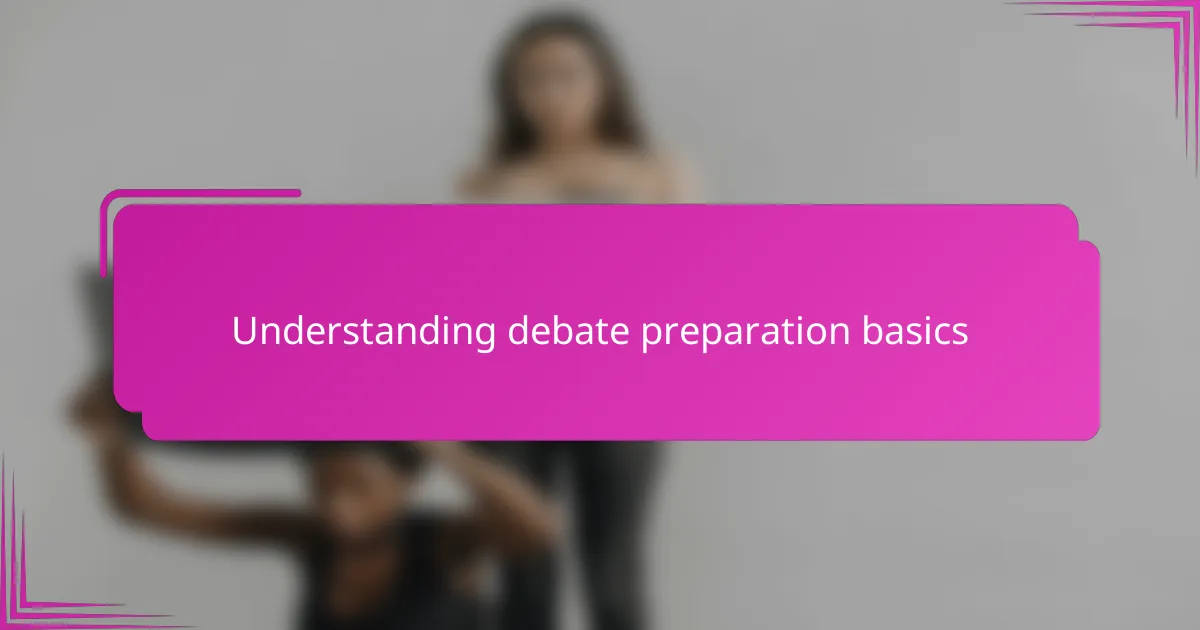
Understanding debate preparation basics
When I first started preparing for debates, I quickly realized that understanding the basics is more than just memorizing facts; it’s about grasping the core issues deeply enough to respond confidently under pressure. Have you ever felt that moment of panic when a question hits you unexpectedly? That’s where solid preparation makes all the difference—it builds that calm, steady confidence.
From my experience, breaking down complex topics into key points helps me stay focused and avoids getting overwhelmed. It’s like having a mental roadmap that guides your responses, ensuring you don’t lose sight of your main message. This approach has saved me numerous times when the debate gets fast-paced and challenging.
Most importantly, I’ve learned that preparation isn’t just about what you say, but how you say it. Tone, body language, and timing play crucial roles in persuading your audience. Have you ever watched a strong answer fall flat because of a lack of conviction? It’s a reminder that mastering basics means practicing every aspect, not just the words.
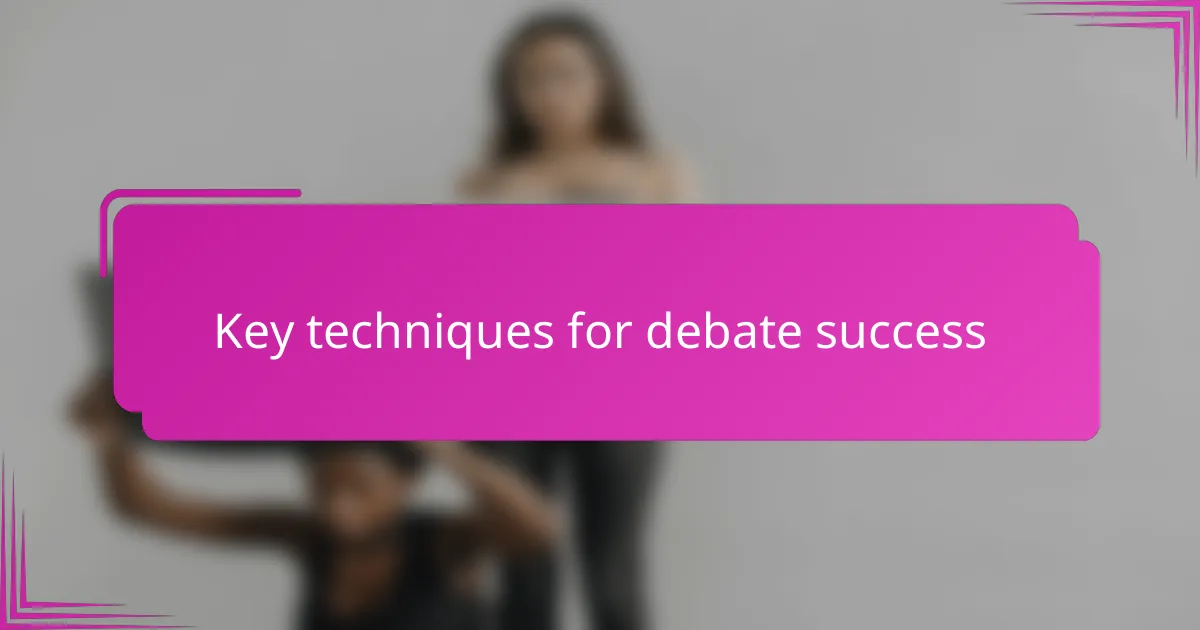
Key techniques for debate success
One key technique I always rely on is rehearsing with a variety of opponents. It’s one thing to prepare alone, but facing different styles and unexpected arguments sharpens your adaptability. Have you ever noticed how a sudden twist in a question can throw you off? Practicing with others helps turn that surprise into an advantage instead of a stumbling block.
Another technique that’s become a game-changer for me is recording practice sessions. Listening back reveals subtle habits—maybe a hesitant tone or a repetitive phrase—that I wouldn’t catch in the moment. It’s humbling but incredibly effective. Isn’t it fascinating how small tweaks in delivery can make your message far more compelling?
Lastly, I’ve found that developing a few strong, memorable soundbites can anchor your points in the audience’s mind. When the debate feels like a whirlwind, those concise, punchy lines keep your main ideas clear and powerful. Do you remember a speech that stuck with you—why did it resonate? That’s the power of well-crafted messaging, and it’s worth investing time to create your own.
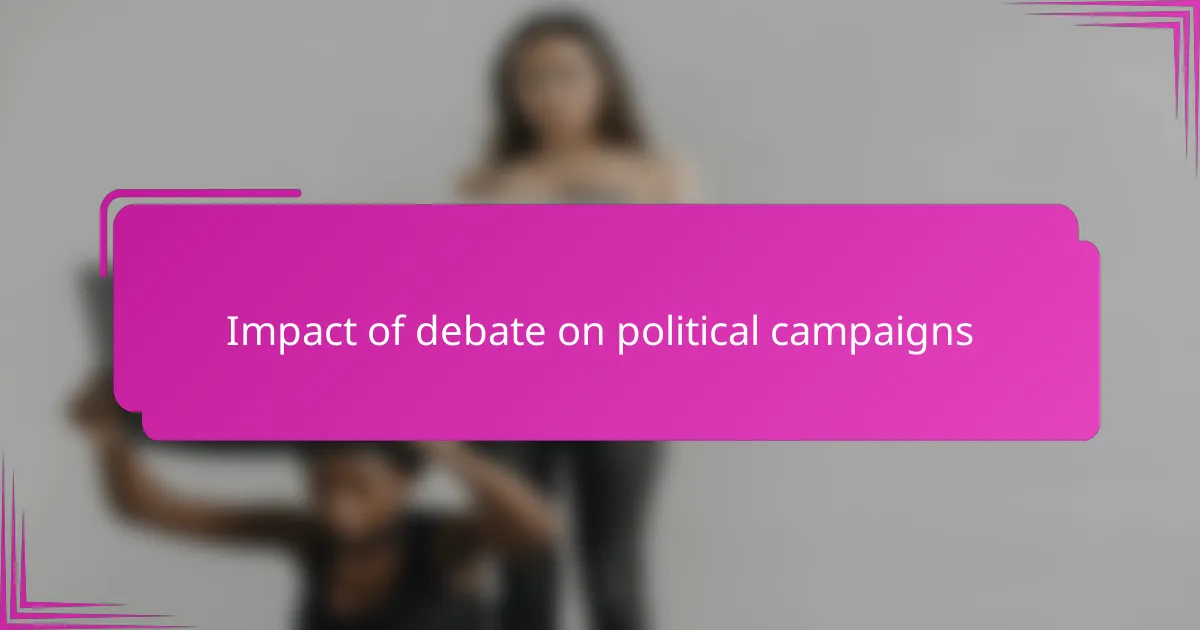
Impact of debate on political campaigns
Debates can make or break political campaigns, especially within the competitive landscape of US Republican races. I’ve seen firsthand how a strong debate performance can propel a candidate from obscurity to the national spotlight almost overnight. Have you ever noticed how a single moment on stage can shift public perception and media narratives in unexpected ways?
From my experience, debates serve as a real-time test of a candidate’s ability to think on their feet and connect with voters. When a candidate struggles to articulate clear positions or falters under pressure, it often creates doubts about their leadership abilities. It’s not just about winning the argument—it’s about inspiring confidence and trust among supporters and undecided voters alike.
What’s been particularly striking to me is how a well-prepared debate can energize a campaign’s momentum, turning somber fundraising meetings into rallies filled with hope. Conversely, a poor showing can trigger immediate setbacks, forcing strategists back to the drawing board. In those moments, you realize just how critical every answer and every gesture truly is.
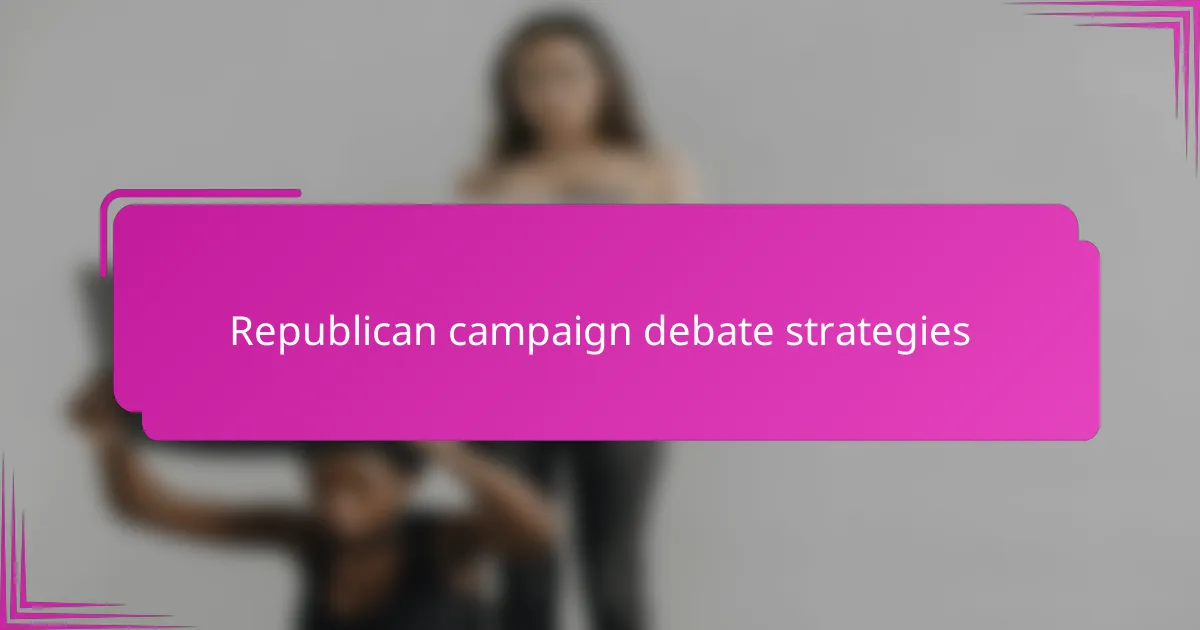
Republican campaign debate strategies
When preparing for Republican campaign debates, I’ve noticed that framing your message around core party values—like limited government and strong national defense—creates a solid foundation that resonates with the base. Have you ever seen a candidate stumble because their answers felt disconnected from what their supporters care about? Staying rooted in these themes helps maintain authenticity and keeps the audience engaged.
One strategy I’ve come to rely on is anticipating attacks not just on policy, but on character and past decisions. In the heat of a debate, it’s easy to get flustered when personal critiques come flying. From my experience, rehearsing calm, principled responses beforehand turns those moments from weaknesses into strengths, building voter trust rather than doubt.
I also think the pacing of responses matters more than people realize. I remember watching a debate where a candidate rushed through answers, sounding rehearsed instead of conversational. Slowing down to make each point deliberate and impactful made all the difference in connecting with viewers. Isn’t it interesting how the way something’s said can change how it’s received? That’s a subtle but powerful tool in any Republican debate strategy.

Personal experiences with debate preparation
One vivid memory I have is the night before a major debate when I stayed up late reviewing notes and practicing my responses aloud. The exhaustion was real, but that ritual helped me internalize my key messages so they felt natural, not forced. Have you ever experienced that moment when sheer repetition suddenly turns nervous energy into confidence? That’s exactly what happened to me, and it was a game-changer.
During one particular debate prep, I underestimated the importance of staying hydrated and taking breaks. I felt drained halfway through the session, which dulled my focus and made it harder to think creatively. Now, I always remind myself that physical wellbeing plays a big role in mental sharpness. It might sound simple, but it’s surprising how often this part gets overlooked.
What really stuck with me, though, was learning to embrace feedback—even when it stung. Sitting through tough critiques from my team was uncomfortable but necessary. Each pointed suggestion chipped away at bad habits and helped me present a more polished version of myself. Have you ever noticed how constructive criticism, though hard to swallow at first, often unlocks your true potential? That lesson has shaped every debate prep since.
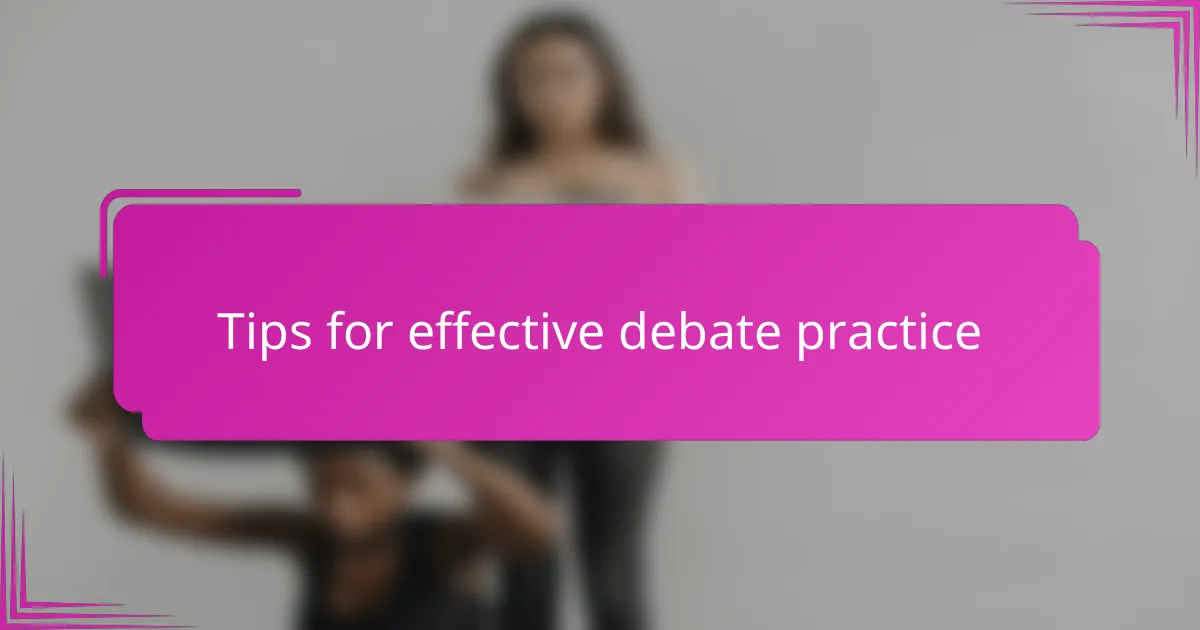
Tips for effective debate practice
One tip that’s stuck with me through countless practice sessions is setting realistic, timed rounds. When I simulate the actual debate’s pace, it forces me to prioritize my thoughts quickly and speak concisely. Have you ever tried practicing your answers with a stopwatch? It’s surprising how much clearer and more focused your points become when the clock is ticking.
Another technique I rely on is switching roles during practice. Sometimes I play my opponent, challenging myself with tough questions or alternate viewpoints. This exercise has saved me from getting too comfortable with my own arguments and helps me prepare for curveballs. Isn’t it amazing how stepping into the other side’s shoes sharpens your critical thinking?
Finally, I can’t overstate how valuable it is to get comfortable with silence—pausing before answering. Early on, I rushed to fill gaps, fearing it looked like hesitation. But I’ve learned that a brief pause shows thoughtfulness and control. Have you noticed how a well-timed pause can make your words hit harder? That small trick made a big difference in how I connect with audiences during debates.
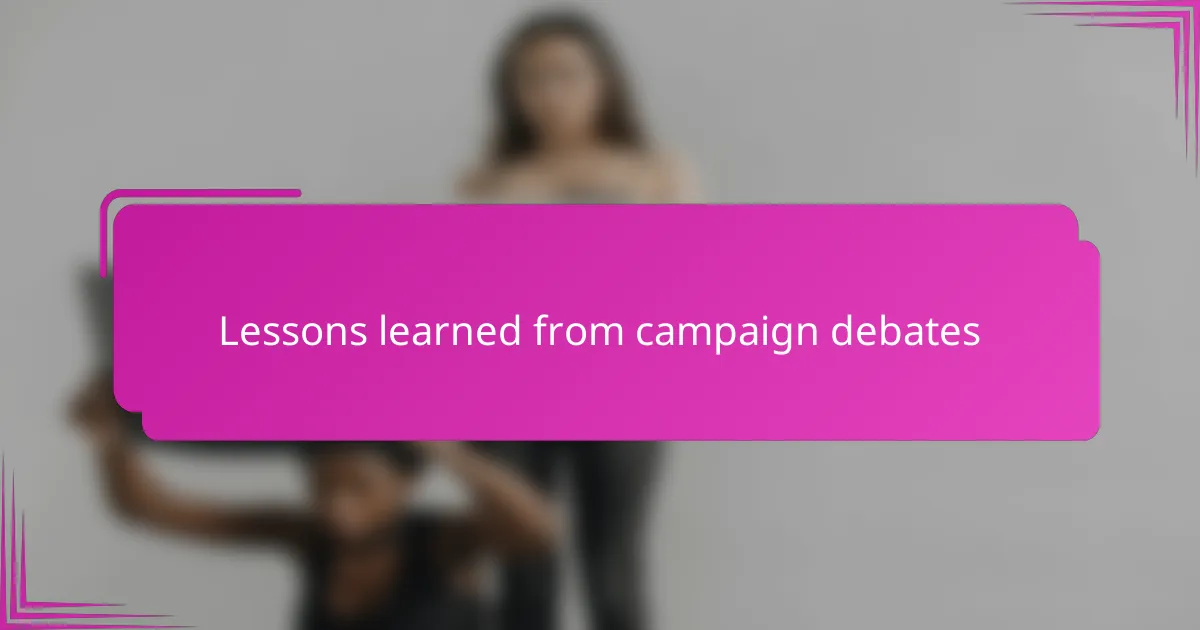
Lessons learned from campaign debates
One lesson that stands out to me from campaign debates is how quickly you learn to read the room. Early on, I underestimated the power of gauging audience reactions in real time. Have you ever been mid-answer and noticed a shift in the crowd’s energy? It’s a subtle cue that can guide you to emphasize certain points or change your tone, and mastering that feels almost like a secret weapon.
Another insightful takeaway is the importance of resilience. I recall a debate where I stumbled on a crucial question and felt the weight of those eyes on me. In that moment, it would have been easy to shut down, but pushing through—acknowledging the slip and moving forward confidently—actually won more respect than a perfect answer might have. Isn’t it interesting how vulnerability paired with composure can create a stronger connection with voters?
What really struck me, though, is how every debate is a masterclass in timing. From knowing when to interrupt politely to figuring out how long to hold an audience’s attention, those seconds can tip the scales. Have you noticed how some candidates seem to have an instinctive sense for pacing? That skill isn’t accidental—it’s honed through experience and sometimes hard lessons learned from missed opportunities.